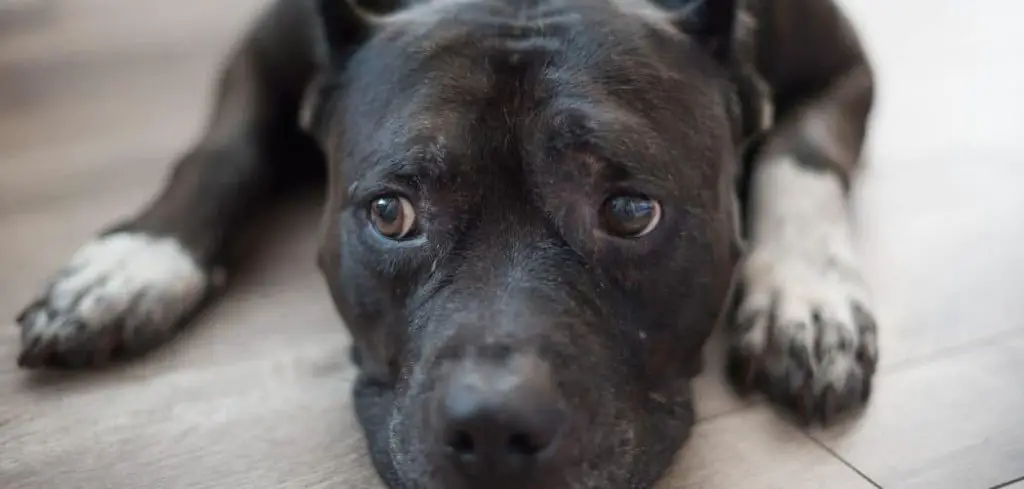It’s the middle of the night, and your dog won’t settle—panting heavily and pacing around the house.
While occasional panting can be normal, excessive nighttime panting can be a sign of something more serious.
We outline the common causes of a dog panting excessively at night, what you can do at home, and when to seek veterinary help.
Dog Panting Excessively at Night — Why It Happens
Excessive nighttime panting in dogs can be triggered by pain, anxiety, overheating, or underlying health conditions.
It might be related to arthritis discomfort flaring up at night, cognitive dysfunction in older dogs, or hidden illnesses like heart disease. Environmental factors—such as a hot room or loud noises—can also contribute.
The causes range from behavioral to medical, and understanding what’s going on is key to helping your dog rest peacefully.

Common Causes of Dog Panting Excessively at Night
Pain or Discomfort
Dogs in pain often pant more, especially when lying down becomes uncomfortable. Nighttime arthritis flare-ups or injuries may make it hard for your dog to relax.
You may notice them pacing, unable to settle, or vocalizing. Pain-related panting is a red flag—especially if your dog doesn’t typically pant at night.
This is serious because unrelieved pain can lead to stress, disrupted sleep, and worsening health.
Read more: Dog Panting Excessively and Restless (Why your dog won’t settle down)
Anxiety or Nighttime Restlessness
Some dogs experience heightened anxiety at night, known as sundowning. This is especially common in older dogs with cognitive dysfunction syndrome (CDS).
Your dog may pant, pace, and appear disoriented or clingy. Fireworks, thunderstorms, or changes in routine can also spark nocturnal anxiety.
Anxiety-driven panting is distressing for both the dog and owner—and needs behavioral or medical support.
Overheating or Poor Ventilation
If your home is too warm at night or your dog’s bed traps heat, they might be overheating. Dogs don’t sweat like humans—they pant to cool down.
Flat-faced breeds like Bulldogs are particularly prone to heat-related distress. Nighttime heat buildup, especially in summer, can lead to excessive panting.
This is dangerous because dogs can overheat quickly—even indoors.
Heart or Respiratory Conditions
Conditions like congestive heart failure or collapsing trachea often worsen at night when your dog is lying down. Fluid buildup or restricted airways make breathing harder.
Panting may be accompanied by coughing, restlessness, or labored breathing. These signs may appear suddenly or gradually.
Cardiopulmonary causes are urgent and should never be ignored.
Read more: Dog Panting Excessively (Here’s why)
Side Effects of Medication
Certain medications, like steroids or pain relievers, can increase panting—especially if given in the evening.
If your dog started a new medication recently and now pants more at night, talk to your vet. The timing, dosage, or drug itself may need adjusting.
Medication-related panting may not always be dangerous, but it should be discussed.
What to Do If Your Dog Is Panting Excessively at Night
Start by evaluating your dog’s environment. Make sure the room is cool, well-ventilated, and quiet. Use a fan or AC if needed—especially for brachycephalic breeds.
Check if your dog might be in pain. Watch how they move, lie down, or react to touch. If arthritis is suspected, a supportive orthopedic bed may help until you can get veterinary advice.
Try calming aids for anxiety—such as a white noise machine, Adaptil diffuser, or natural supplements (with your vet’s approval). Keeping a consistent nighttime routine can also reduce stress.
Avoid exercising your dog right before bedtime, especially in warm weather. Allow them to cool down fully before settling in.
Document how often the panting occurs and whether other symptoms (coughing, limping, whining) accompany it. This information is valuable for your vet.
When to Call or Visit Your Vet
Call your vet if your dog’s nighttime panting:
Appears suddenly and is intense or unrelenting
Is accompanied by signs like coughing, drooling, limping, or confusion
Doesn’t improve with environmental changes or calming techniques
Occurs along with reduced appetite, lethargy, or vomiting
Worsens over time, especially in senior dogs
These signs may indicate heart disease, pain, respiratory issues, or cognitive decline—all of which need medical attention.
Read more: Dog Excessively Panting and Pacing (What’s normal and what’s not?)
Key Takeaway
Panting excessively at night isn’t something to ignore—especially when it disrupts your dog’s sleep or signals discomfort.
Keep their environment cool and stress-free, monitor for other symptoms, and reach out to your vet if it continues.
With care and the right support, your dog can enjoy calmer, more restful nights.
